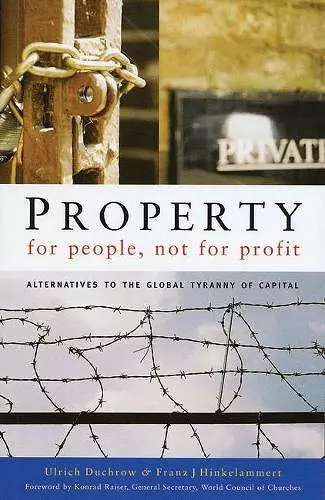Property for People, Not for Profit
Alternatives to the Global Tyranny of Capital
Franz J Hinkelammert author Ulrich Duchrow author
Format:Paperback
Publisher:Bloomsbury Publishing PLC
Published:1st Jan '04
Currently unavailable, and unfortunately no date known when it will be back

The issue of private property and the rights it confers remains almost undiscussed in critiques of globalization and free market economics. Yet property lies at the heart of an economic system geared to profit maximization. This text describes the specific and self-consciously explicit manner in which it emerged.
The issue of private property and the rights it confers remain almost undiscussed in critiques of globalization and free market economics. Yet property lies at the heart of an economic system geared to profit maximization. The authors describe the historically specific and self-consciously explicit manner in which it emerged. They trace this history from earliest historical times and show how, in the hands of Thomas Hobbes and John Locke in particular, the notion of private property took on its absolutist nature and most extreme form - a form which neoliberal economics is now imposing on humanity worldwide through the pressures of globalization. They argue that avoiding the destruction of people‘s ways of living and of Nature requires reshaping our notions of private property. They look at practical ways for social and ecumenical movements to press for alternatives.
'This is a strong message, one that makes connections in politics, economics, philosophy and scripture. It is encouragement for those who have been told that there is no alternative, and urges upon us the claims of economic and political discipleship. It will bring excitement, challenge and controversy to any group.' The Rt Revd Peter Selby, Bishop of Worcester and Bishop to HM Prisons 'Faith-based groups are enormously important in the global justice movement and they are on the move, as this penetrating and crucial text demonstrates. It is incumbent on us all to incorporate this dimension in our own analyses so that we can move forward in unity, secularists and faith-oriented together, in the common quest for justice. This book is a great step forward on that road.' Susan George, author and campaigner 'This learned book makes an important contribution to the growing Christian literature denouncing today‘s neo-liberal capitalism as an economic engine of destruction. The authors demonstrate that the globalization of the unregulated market, driven by the accumulation of property and protected by military empire, leads to the impoverishment of ever wider sectors of humanity and the devastation of the natural environment, promoting a civilization of death. By contrast, the authors show that according to the biblical tradition and the teaching of Jesus, property is intended to foster life and serve the common good. The present march towards death can only be stopped by a conversion to the biblical message, recognizing the conditional character of property, democratizing the ownership of productive goods, and creating economic development that serves human well-being and protects the earth. Relying on God‘s Word, the Church must condemn the march toward death and propose community-based economic development that serves life.' Gregory Baum, Professor Emeritus, McGill-Queens University, theologian 'This book is an interesting and significant contribution to the growing discussion on the adverse effects of the implementation of unbridled global market activities. It also has good ideas on what can be done to rectify the situation. I hope many people will read it and draw lessons from it.' Martin Khor, Third World Network 'I highly recommend Property for People, Not for Profit. Capitalism today is too often thought of as natural or God-given when a careful examination of the history of its development and the evolution of religious thought shows that there are other ways to think about how our economy and society should be organized. The most valuable contribution of this book, however, is to show how another world is possible. Duchrow and Hinkelammert also challenge the churches to renounce the worship of Mammon and serve the God of life by supporting social movements working for alternatives.' Dennis Howlett, KAIROS: Canadian Ecumenical Justice Initiatives
ISBN: 9781842774793
Dimensions: unknown
Weight: unknown
256 pages